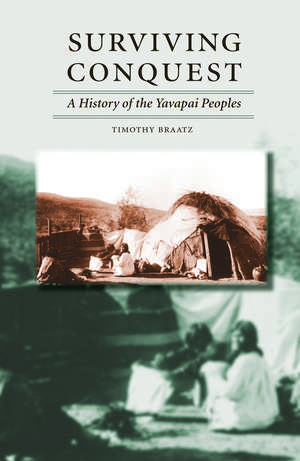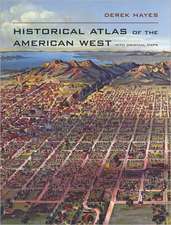Surviving Conquest: A History of the Yavapai Peoples
Autor Timothy Braatzen Limba Engleză Paperback – sep 2007
Surviving Conquest is a history of the Yavapai Indians, who have lived for centuries in central Arizona. Although primarily concerned with survival in a desert environment, early Yavapais were also involved in a complex network of alliances, rivalries, and trade. In the sixteenth and seventeenth centuries European missionaries and colonizers moved into the region, bringing diseases, livestock, and a desire for Indian labor. Beginning in 1863, U.S. settlers and soldiers invaded Yavapai lands, established farms, towns, and forts, and initiated murderous campaigns against Yavapai families. Historian Timothy Braatz shows how Yavapais responded in a variety of ways to the violations that disrupted their hunting and gathering economies and threatened their survival. In the 1860s, some stole from American settlements and some turned to wage work. Yavapais also asked U.S. officials to establish reservations where they could live, safe from attack, in their homelands.
Despite the Yavapais’ successful efforts to become sedentary farmers, in 1875 U.S. officials relocated them across Arizona to the San Carlos Apache Reservation. For the next twenty-five years, they remained in exile but were determined to return home. They joined the commercial Arizona economy, repeatedly requested permission to leave San Carlos, and, repeatedly denied, left anyway, a few families at a time. By 1901 nearly all had returned to Yavapai lands, and through persistence and savvy lobbying eventually received three federally recognized reservations. Drawing on in-depth archival research and accounts recorded in the early twentieth century by a Yavapai named Mike Burns, Braatz tells the story of the Yavapais and their changing world.
Preț: 161.86 lei
Nou
Puncte Express: 243
Preț estimativ în valută:
30.97€ • 32.34$ • 25.63£
30.97€ • 32.34$ • 25.63£
Carte tipărită la comandă
Livrare economică 05-19 aprilie
Preluare comenzi: 021 569.72.76
Specificații
ISBN-13: 9780803222427
ISBN-10: 0803222424
Pagini: 301
Ilustrații: 3 maps
Dimensiuni: 152 x 229 x 15 mm
Greutate: 0.44 kg
Ediția:New.
Editura: Nebraska Paperback
Colecția University of Nebraska Press
Locul publicării:United States
ISBN-10: 0803222424
Pagini: 301
Ilustrații: 3 maps
Dimensiuni: 152 x 229 x 15 mm
Greutate: 0.44 kg
Ediția:New.
Editura: Nebraska Paperback
Colecția University of Nebraska Press
Locul publicării:United States
Notă biografică
Timothy Braatz is an assistant professor of history at Saddleback College.
Recenzii
"Braatz fills a huge gap in the ethnohistorical literature on the American Southwest. . . . The author employs many heretofore unused or underused Native accounts of their past, thereby allowing the Yavapai to tell their own story."—Choice
"Timothy Braatz has written a book to read slowly, knowing that some images will never fade, and some versions of history will never hold again."—Barbara Riley, Southwest Book Views
"A thoroughly researched and engaging investigation into one of the most misunderstood indigenous communities of the American Southwest. . . . An excellent tribal history that untangles the complex motivations, perspectives, and challenges facing the Yavapai people in the nineteenth century."—Jeffery Shepherd, Western Historical Quarterly
“With its highly readable style, thorough documentation, and use of Yavapai sources, this book fills an important gap in the ethnographic and historical literature of the Southwest. By adding the voices of the Yavapai peoples, this exceptional narrative contributes greatly to our understanding of history from the Yavapai perspective, something that has long been missing in accounts of the history of the Southwest.”—Trudy Griffin-Price, New Mexico Historical Review
“Throughout Surviving Conquest, Braatz is able to present a detailed historical narrative without losing sight of the human consequences of state territorial expansion. He documents how incursions of missionaries, fur trappers, miners, and militia disrupted Yavapai life, often in brutal and heart-wrenching ways. . . . Surviving Conquest presents a record of Yavapai perseverance and is a testimony to the efforts of individuals like Mike Burns and Carl Montezuma, who were able to build from their experiences gained in diaspora to secure Yavapai lands and culture in the twentieth century.”—SMRC Revista (Southwestern Mission Research Center)














